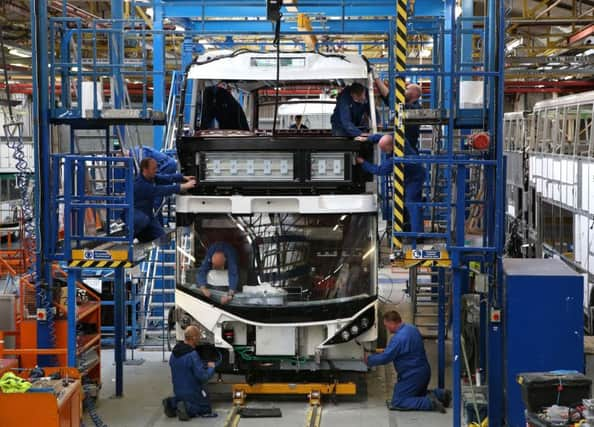Productivity in Scotland at '˜lowest level in eight years'


Official labour statistics for the quarter lasting July-September 2017 showed trend-based productivity fell to a level last seen in the fourth quarter of 2009.
On an annual basis, productivity, measured as output per hour worked, declined 3.2 per cent in the year to end-September 2017.
Advertisement
Hide AdAdvertisement
Hide AdThe Scottish Government acknowledged there had been a dip over the last year, but said annual producivity levels had increased in Scotland by 5.4 per cent since 2007, and added the Scottish economy was continuing to grow.
But opposition parties described the productivity levels as “grim”.
“Improving productivity is the key driver to overall economic success in the long-term and has a direct impact on real wages and living standards,” said Scottish Conservative economy spokesman Dean Lockhart.
“Productivity under the SNP has now declined to its lowest level in Scotland for eight years and is well-below levels in the rest of the UK.
“The SNP has control over the enterprise and economic development powers that can positively change productivity in Scotland.
“Instead of improving productivity however, the SNP has decided to make Scotland the highest-taxed part of the UK and to increase the tax burden on business.”
Scottish Labour economy spokeswoman Jackie Baillie said: “These grim statistics for productivity should be jolting the SNP government into action, instead of the same tired old lines about the economy being on solid foundations.
“Labour has taken the lead on producing ideas to boost productivity, with a comprehensive industrial strategy released last year.
Advertisement
Hide AdAdvertisement
Hide Ad“The government should also be using the £11 billion a year we spend on public contracts and procurement to drive up labour standards, pay more workers a real living wage and ban zero hours contracts - because falling income and insecurity for workers leads to falling productivity.
A Scottish Government spokeswoman said: “Scotland’s economy continues to grow and, while there is no room for complacency, it is encouraging that these statistics show a strong increase in the number of hours worked in recent quarters.
“Despite the dip in productivity over the last year, annual productivity levels have increased by 5.4 per cent in Scotland since 2007, compared to only 1.4 per cent. growth for the UK as a whole. The most recent labour market statistics show our unemployment rate has been lower than the UK’s for 11 consecutive months and we are also outperforming the UK on employment, unemployment and inactivity rates for young people and women, demonstrating that the fundamentals of our economy continue to be strong.
“However it cannot be stressed enough that Brexit remains the single biggest threat to our economy. Our latest analysis, confirmed by the UK Government’s own analysis shows a hard-Brexit could cost Scotland’s economy £12.7 billion a year by 2030, so we continue to use all of the powers at our disposal to grow our economy.”
